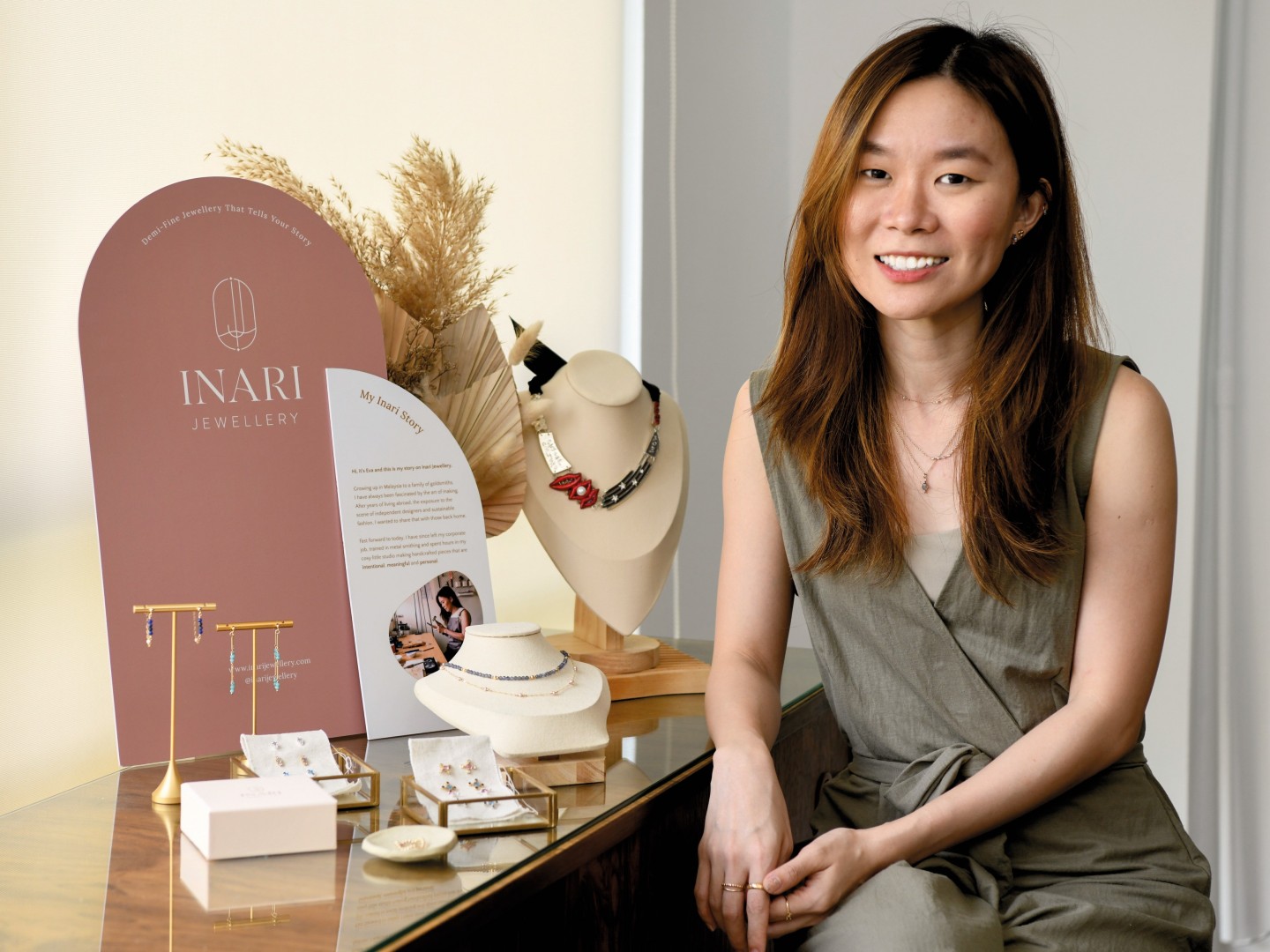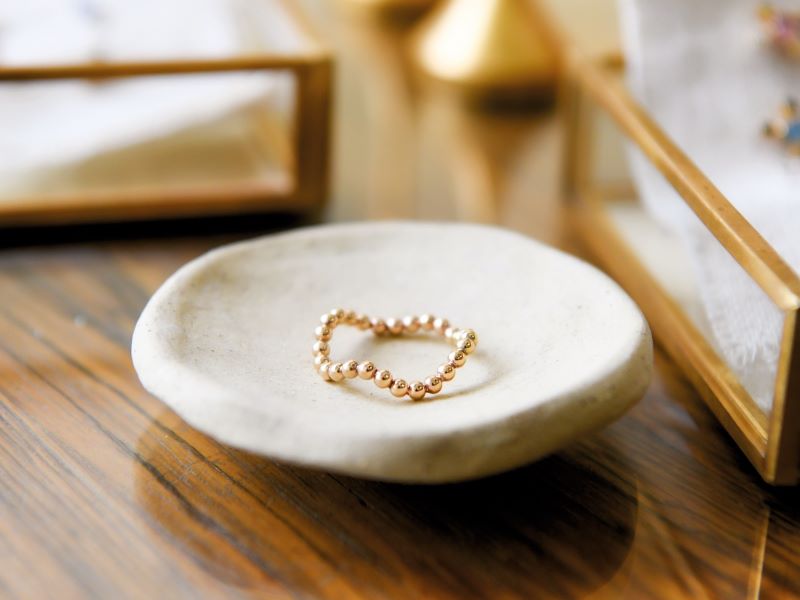
Founder Eva Woon's relatives, including her grandparents, had worked as goldsmiths (All photos: Low Yen Yeing/The Edge)
American businesswoman and eternal style icon Iris Apfel — who passed away recently on March 1 — was once quoted as saying, “Fashion you can buy, but style you possess.”
When it comes to finding one’s unique look, jewellery is one element of an ensemble that cannot be overlooked. This is no surprise as these precious wearables are usually bought and gifted with sentimental intent, further shaped by the experiences and emotions one grows to associate with each piece through the years. That is why, when compared to other accessories and wearables, jewellery has a greater capacity to carry the wearer’s dearest memories and echo narratives that have been passed down through generations.
Local brand Inari Jewellery holds fast to the practice of making meaningful pieces. After all, founder Eva Woon has filial roots in the art. Several of her relatives, including her grandparents, had worked as goldsmiths and she grew up watching them create. “Growing up, we would always visit their stores, the old tukang emas ones,” she says.
Despite her lifelong interest in fashioning beautiful things, it was not until Woon had completed her studies and was working in London as a full-time consultant that she ventured into metalsmithing as a hobby. Later, she co-founded her first business with a friend but eventually closed it when they moved away from the UK.
Not one to be defeated, Woon wanted to move to Bangkok, to study gemology. She was eager to learn more about handling and crafting precious stones and to obtain certification. “I thought, ‘Oh, I need to learn this to understand more about gemstones before I can properly start a jewellery business’. But then Covid-19 happened. So, I cancelled that plan because I had to stay in Malaysia.”
In line with her family’s trade, her mother made woven beaded jewellery, typically as gifts for family and friends. “I never understood why she would make these things and just give them away,” Woon recalls. So, while on a four-month sabbatical she had initially taken for her trip to the Land of Smiles, she decided to help mum monetise her talent.
20240223_peo_inari_jewellery_11_lyy.jpg

Woon would later return to her consulting job and, with her busy corporate schedule, jewellery-making took a backseat. Noticing that her drive seemed to have faded, her mother prompted her to start crafting again.
“I realised I needed to do something I’m truly passionate about,” says Woon. “At that point in time, my mum was making all the jewellery we sold and I was just handling the business side of things. That was when I decided to take metalsmithing seriously.”
After going to classes throughout 2020, she officially launched Inari in July 2021 — nearly two years after thinking about starting her own label.
Purchasing something nice is a marker of doing well in life for many people. This feeling of success and contentment lies at the core of Inari’s name and branding. “It represents the Japanese deity of abundance and plenty,” Woon explains. “Prosperity encapsulates not just wealth, but also health, happiness and empowerment, and I wanted a name that suited this.”
Going from a hectic but financially stable consulting job to being an entrepreneur came with several harsh changes, although Woon notes that she encountered “different challenges at various stages” of her journey. “For me, the biggest thing was getting started,” she laughs, adding that leading up to establishing Inari, she busied herself with backup plans and ensuring that she had enough runway to spend the coming years devoting herself to the new business.
Later on, she struggled with imposter syndrome. “I used to worry about who would want to buy my designs if I didn’t have a formal background in the craft. Once you put yourself out there, you attach a lot of self-worth to your work,” she says.
One thing that sets Inari apart from other brands in the demi-fine market is its transparent approach and desire to educate consumers. “Nobody really tells you what you’re buying,” says Woon. “Anyone can tell you something is demi-fine, tarnish-resistant or gold-filled. But what does that all mean? People don’t really know. People don’t look at the materials of what they’re buying. They usually go for recognisable branding or are influenced by social media.”
20240223_peo_inari_jewellery_10_lyy.jpg

This perspective pays attention to the pricing-related issues many are having with luxury brands and large retailers that sell pieces at a massive markup and enables consumers to purchase quality and style without breaking the bank. And Inari’s customers love this. “Customers keep coming back and telling me they didn’t know so much about jewellery before. They love that they can get good pieces without the crazy price points.”
Beyond Inari’s dainty ready-made designs, Woon also offers customisation services for clients who want to commission one-of-a-kind items. Wedding bands and gifts for special occasions make up most of her current portfolio. Each step of the process, from selecting metals and gemstones to determining how the final piece fits, is done closely with each customer. “I find a lot of joy in listening to people’s stories and translating that into jewellery,” she says.
Recently, Inari took the big step of moving into its own physical location — a double-storey office unit in Sentul, Kuala Lumpur, which Woon hopes to transform into a proper atelier and workshop space. And that is only the tip of the iceberg, as she has other exciting plans on the horizon. Still, as the brand expands, her priority is to build Inari around a human-centric ethos. “It’s important to keep that personal touch as artisans, because customers trust you as a person and resonate with your vision and values.”
As the number of independent demi-fine jewellers dwindles with age and fewer youths pick up the baton, brands like Inari preserve the art of crafting beautiful things meant to accentuate the best moments in life, whether it is buying your first pair of fancy artisanal earrings or a ring to get down on bended knee.
This article first appeared on Mar 11, 2024 in The Edge Malaysia.


